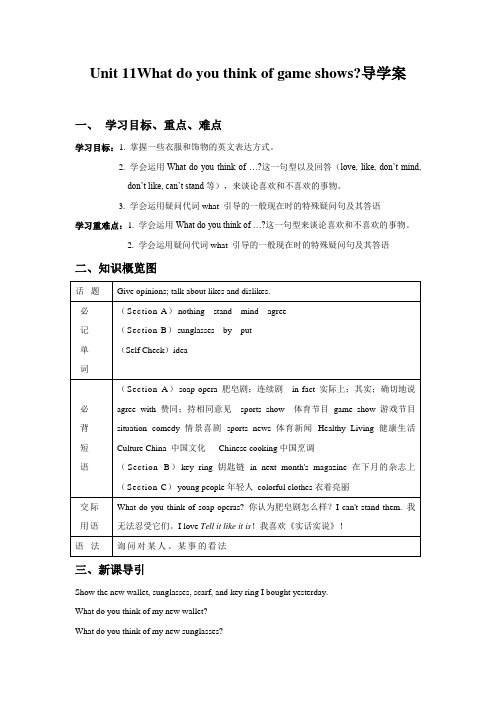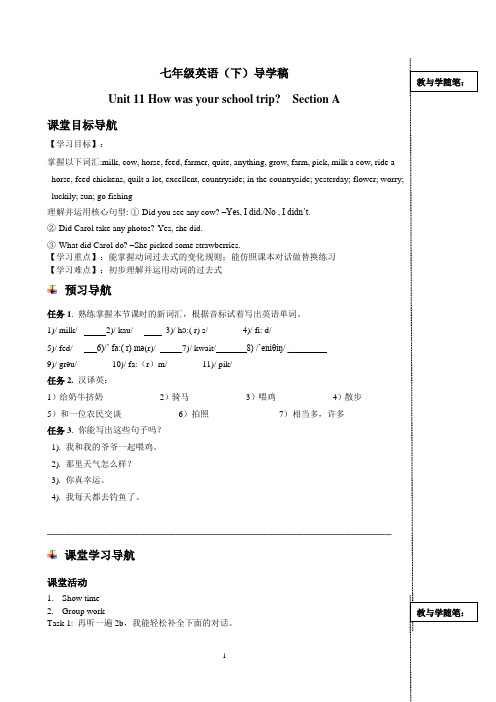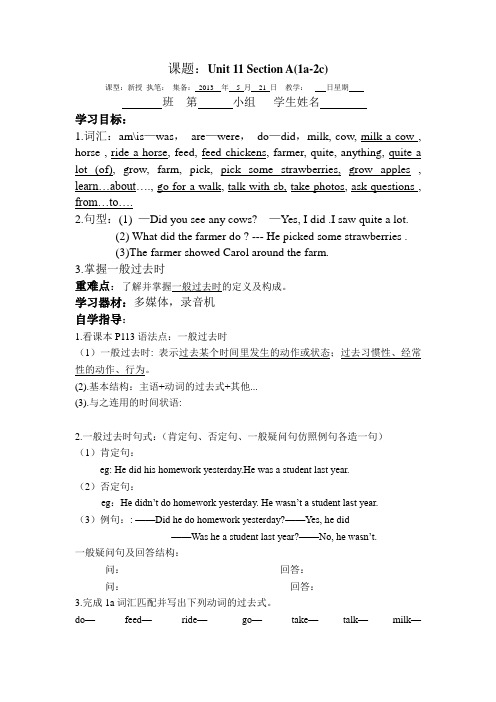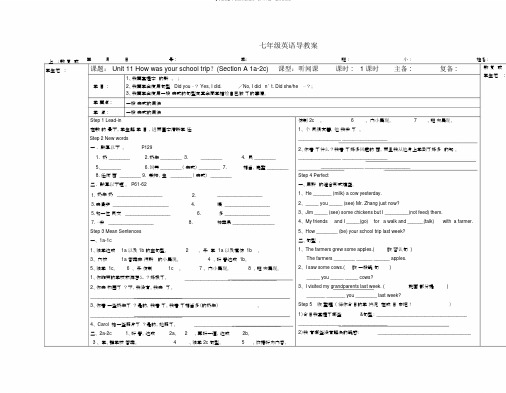七年级英语下册_Unit11导学案
- 格式:doc
- 大小:224.50 KB
- 文档页数:11

七下英语Unit11 Section A(Period 1)导学案【自学提示】进门测通过预习,翻译下列单词和短语。
1.给奶牛挤奶_________________2.骑马_________________3.去散步_____________________4.喂鸡_________________5.和一位农民交谈_________________6.许多_________________7.带…参观_________________8.种苹果________________【知识点】1、quiet a lot + of + 可数或不可数, 也可以单独使用。
quite a little “相当多, 不少”+ 不可数名词quite a few “相当多, 不少”+ 可数名词e.g. We drank quite a lot of wine. 我们喝了不少酒。
I saw quite a lot of cows. 我看到了相当多的奶牛。
I play tennis quite a lot in the summer. 夏天我经常打网球。
Quite a few students were late. 不少学生迟到了。
2、take与photo, picture等词搭配时,表示“拍摄,摄影”。
表示“拍摄某物或人”,就要在短语后面接介词“of”引入所拍摄的对象。
e.g. The girl likes to take photos of herself with her cell phone. 这个女生喜欢用手机自拍。
3、anything作不定代词,可意为“某事;某东西”,常用在疑问句或否定句中。
something 作不定代词,也可意为“某事;某东西”,常用在肯定句中。
如:I didn’t see anything in the room. 我在屋子里什么也没看见。
I saw something in the room. 我在屋里看见了个东西。

Unit 11What do you think of game shows?导学案一、学习目标、重点、难点学习目标:1. 掌握一些衣服和饰物的英文表达方式。
2. 学会运用What do you think of …?这一句型以及回答(love, like, don’t mind,don’t like, can’t stand等),来谈论喜欢和不喜欢的事物。
3. 学会运用疑问代词what 引导的一般现在时的特殊疑问句及其答语学习重难点:1. 学会运用What do you think of …?这一句型来谈论喜欢和不喜欢的事物。
2. 学会运用疑问代词what 引导的一般现在时的特殊疑问句及其答语二、知识概览图三、新课导引Show the new wallet, sunglasses, scarf, and key ring I bought yesterday.What do you think of my new wallet?What do you think of my new sunglasses?Talk about the things by using the sentences:I love it.I don’t like it.I don’t mind it.I can’t stand it.四、教材精华1. What do you think of soap operas?你认为肥皂剧怎么样?本句中What do you think of…? 意为“你认为……怎么样?”是用于询问某人对某事看法的固定句式,其近说法还有How do you like…?/What do you think about…?等。
—What do you think of the film? 你认为这部电影怎么样?—It’s very interesting.很有趣。
—How do you like China? 你认为中国怎么样?—I think it’s great. 我认为它很伟大。

Unit 11 How was your school trip? Section A课堂目标导航【学习目标】:掌握以下词汇:milk, cow, horse, feed, farmer, quite, anything, grow, farm, pick, milk a cow, ride a horse, feed chickens, quilt a lot, excellent, countryside; in the countryside; yesterday; flower; worry; luckily; sun; go fishing理解并运用核心句型: ①-Did you see any cow? –Yes, I did./No , I didn’t.②-Did Carol take any photos?-Yes, she did.③-What did Carol do? –She picked some strawberries.【学习重点】:能掌握动词过去式的变化规则;能仿照课本对话做替换练习【学习难点】:初步理解并运用动词的过去式预习导航任务1. 熟练掌握本节课时的新词汇,根据音标试着写出英语单词。
1)/ milk/ _ 2)/ kau/ __ 3)/ hɔ:( r) s/ _______ 4)/ fi: d/______5)/ fed/ __ 6)/’ fa:( r) mə(r)/_ 7)/ kwait/ 8) /’eniθiŋ/ __9)/ grəu/________10)/ fa:(r)m/________11)/ pik/________任务2.汉译英:1)给奶牛挤奶_____________2)骑马_____________3)喂鸡_____________4)散步_________ 5)和一位农民交谈_____________6)拍照________________7)相当多,许多_____________ 任务3. 你能写出这些句子吗?1). 我和我的爷爷一起喂鸡。

课题:Unit 11 Section A(1a-2c)课型:新授执笔:集备:2013 年 5 月21 日教学:日星期班第小组学生姓名学习目标:1.词汇:am\is—was,are—were,do—did,milk, cow, milk a cow , horse , ride a horse, feed, feed chickens, farmer, quite, anything, quite a lot (of), grow, farm, pick, pick some strawberries, grow apples , learn…about…., go for a walk, talk with sb, take photos, ask questions , from…to….2.句型:(1) —Did you see any cows? —Yes, I did .I saw quite a lot.(2) What did the farmer do ? --- He picked some strawberries .(3)The farmer showed Carol around the farm.3.掌握一般过去时重难点:了解并掌握一般过去时的定义及构成。
学习器材:多媒体,录音机自学指导:1.看课本P113语法点:一般过去时(1)一般过去时: 表示过去某个时间里发生的动作或状态;过去习惯性、经常性的动作、行为。
(2).基本结构:主语+动词的过去式+其他...(3).与之连用的时间状语:_________________________________________________________________________________2.一般过去时句式:(肯定句、否定句、一般疑问句仿照例句各造一句)(1)肯定句:____________________________________eg: He did his homework yesterday.He was a student last year.(2)否定句:____________________________________eg:He didn’t do homework yesterday. He wasn’t a student last year.(3)例句:: ——Did he do homework yesterday?——Yes, he did——Was he a student last year?——No, he wasn’t.一般疑问句及回答结构:问:_______________________________回答:______________问:_________________________________回答:__________________ 3.完成1a词汇匹配并写出下列动词的过去式。

Unit 11 What time do you go to school ?第一课时(Section A 1a-2c)姓名:______________ 班级:______________学习目标: 1.谈论日常作息时间。
2.询问、表达时间。
3.掌握what time引导的特殊疑问句的用法及what time和when的用法区别。
学习重点: 1.掌握下列单词或短语:(1)名词:time, shower(2)副词:usually o'clock (3)疑问代词:what time(4)动词短语:go to school, get up, take/have a shower,2.掌握重点句型:(1)-What time do you usually get up? -I usually get up at five o`clock .What time does he / she usually get up ?He / She usually gets up at six o`clock .(2)-What time is it?(将3b中的语言点前移)(询问时间)-It's six o`clock .学习难点: 频率副词usually 的用法。
课前预习:1.读一读,再翻译。
o`clock_________ go to school ___________get up __________take a shower ___________ what time ________ usually _________2.写出下列动词的第三人称单数形式:go ______ get ______ take ______ run ______ eat_______3.试着翻译下列对话:A: What time do you usaully take a shower ?_____________________B:I usually take a shower at seven o`clock . ———————————课堂学习:1 同学们在生活中我们经常会问现在几点了?你会用英语问吗?请你翻译下列对话?A :几点了?_____________________ ?B :八点了。

【人教版】七年级下册英语:Unit11第一课时导学案上:教复或学生笔 :七年级英语导教案年月日号 :字:班:小:姓名:课题: Unit 11 How was your school trip?(Section A 1a-2c)课型:听闻课课时 : 1 课时主备 :复备 :教复或学生笔 :1、我要掌握本的新、;学目 :2、我要学会使用句型 Did you ⋯? Yes, I did./No, I did n’ t. Did she/he ⋯?;3、我要学会使用一般去式的句型向其余同学描绘自己做了的事情。
学要点 :一般去式的用法学点 :一般去式的用法Step 1 Lead-in在教的景下,学生解学目,进而基本清晰学任Step 2 New words一 . 默写以下。
P1291. 奶 ________2.奶牛 ________3.________4. 民 ________5.________6.饲养 ________(去式) ________7.相当,完整 ________8. 任何西 ________ 9. 栽种,生 ________(去式) ________二. 默写以下短。
P61-621.奶牛奶 _________________2._________________3.去漫步 _____________________4.喂 _________________5.和一位民交 _________________6.多 _________________7.⋯参 _________________8.种苹果 ________________Step 3 Mean Sentences一、 1a-1c1、独学达成1a 以及 1b 的主句型。
2、子学 1a 以及模仿 1b 。
3、内核1a 答案并行所的小展现。
4 、听音达成 1b。
5、独学 1c。
6 、子仿制1c 。
7 、内小展现。
8、班大展现。
1、你昨天的学校旅游怎么?好极了。
【人教版】七年级下册英语:Unit11第二课时导学案上:教复或学生笔 :七年级英语导教案年月日号 :字:班:小:课题: Unit 11 How was your school trip?(Section A 2d-3c)课型:预展课课时 :第 2课时主备 :复备 :1、掌握本的新、及句子;学目 :2、学会旅游状况及回答;3、能掌握去能否做了某事及回答;4、极度情,高度任,倾尽全力,在小合作沟通中享受学的快。
学要点 :去能否做了某事及回答。
Did you⋯⋯?学点 :去的一般疑句Step 1名航Step 4 千百在教的景下,学生解学目,进而基本清晰学任一 . 小表演2d(小明确任分工,内合作达成展现任)其余小真听,准疑、价.Step 2排二 . 达成 3a , 3b (先单独达成,而后小沟通,准展现)一 . 默写以下。
P129三 . 堂1.任何西,任何事情2.栽种;生、育3.采;摘 1. He went to Beijing last year.(改一般疑句 )4、;5、极好的、秀的 6.村、村7.昨天8.花9.担忧、担 2.The farmers( grow) apples last year.10. 好运地、好运的11.太阳 3.Did you see(something)?二 . 默写以下短。
P62-63 4.I saw a lot of flowers and( take ) some photos.1.在下、在村2.某人参 5.I(not see)any cows on the farm last week.3.去4.看星星 6.The weather was bad.But(lucky) we brought our raincoat5.你真好运6.登山with us.7.-Your sweater looks nice.-Where you it?Step 3句型再写出以下12 个句子。
人教版新目标七年级英语下册Unit 11 导学案课题:Unit 11 A1 课型:New 课时数:2课时班级: 姓名:【教学目标】Talk about past events.【德育目标】Understanding the cultural differences of China and the West.【重点难点】simple past of regular and irregular verbs【教学过程】二次备课预习指导:I. 预习课本P114,P61, P62写出下列单词的过去式1. ask ___________ learn ____________ pick ___________ visit _________watch _________ milk ____________ talk ____________2. live _________ hope __________ use _________3. stop _________ plan __________4. stud y_________ carry ___________ worry ____________5. go ____________ ride ______________ feed _________ take __________do ____________ say ______________ grow_________ eat _____________is _________ are _________II. 预习并写出下列词组和句子(用过去式)1.去散步_______________2.挤牛奶__________________3.骑马__________________4.喂鸡____________________5.和农民谈话______________6.照相____________________7.种苹果__________________ 8.摘草莓__________________9.你的学校旅行怎么样? 太棒了_________________________________________________________13.你看见奶牛了吗? 是的。
课题:Un it 11 Section A(1a-2c)课型:新授执笔:集备:2013 年5月21日教学: _日星期________________________________ 班第 ________ 小组学生姓名__________学习目标:1. 词汇:am\is—was, are— were, do—did,milk, cow, milk a cow , horse , ride a horse, feed, feed chickens, farmer, quite, anything, quite a lot (of), grow, farm, pick, pick some strawberries, grow apples ,learn …about :-gofor a walk, talk with sb, take photos, ask questions ,from …to ….2. 句型:(1) —Did you see any cows? —Yes, I did .I saw quite a lot.(2) What did the farmer do ? --- He picked some strawberries .(3) The farmer showed Carol around the farm.3•掌握一般过去时重难点:了解并掌握一般过去时的定义及构成。
学习器材:多媒体,录音机自学指导:1•看课本P113语法点:一般过去时(1) 一般过去时:表示过去某个时间里发生的动作或状态;过去习惯性、经常性的动作、行为。
(2) •基本结构:主语+动词的过去式+其他…(3) .与之连用的时间状语:_________________________________2. —般过去时句式:(肯定句、否定句、一般疑问句仿照例句各造一句)(1)肯定句: _______________________________________eg: He did his homework yesterday.He was a stude nt last year.(2)否定句: _______________________________________eg: He didn ' t do homework yesterday. He wasn ' t a student last year.(3) ------------------ 例句::Did he do homework yesterday?——Yes, he did---- Was he a student last yea——No, he wasn ' t.一般疑问句及回答结构:问:________________________________ 回答:_______________问:__________________________________ 回答:____________________3. 完成1a词汇匹配并写出下列动词的过去式。
新目标七下Unit 11语法学法导学案学习目标:1.能在故事情境中感知一般过去时的用法;并归纳动词过去式的变化规律;一般过去时肯定句;否定句和一般疑问句及回答的基本结构。
2.能在语篇中灵活运用一般过去时。
3.乐于表达善意,提供帮助。
课前自学一.请写出下列动词的过去式。
want__________ arrive__________ stop__________ carry__________ jump__________ live__________ plan__________ worry _________ 这些动词过去式你发现什么规律了吗?___________________________________________________________________________ 二.请写出下列动词过去式的动词原形。
ran __________ took__________ bought__________ saw__________ put__________ drove__________ cost__________ paid__________ 这些动词过去式,有规律吗?___________________________________________________________________________三. 指出下列句子中的一处错误,并改正。
1. We go to school early yesterday. _____________________2. She buys a dress last week. ________________________3. Did you liked playing football? ________________________4.--- Did you have a good trip ? --- No, I did. ______________________5. I didn’t enjoyed Chinese very much. __________________课中导学※语法操练一.读句子选出正确的动词形式,了解Mr. Cool一年前的故事:One day, a year ago…1.An old woman__________(want/wanted) to cross the road.2. She _________ (walk/walked) very slowly.3. She _________ (put/puts) her hands on his arm.4. Mr. Cool didn’t __________(walk/walked) so fast like before.5. A driver _________(drive/drove) very fast.6. They ________(were/was/are/is) scared.7.Mr. Cool_________ (stop/stopped) the car.8. The old woman__________(thank/thanked) him.二.选择助动词(was, were, did) 询问了解Mr. Cool的志愿者生活:1. _________ you a volunteer at the Children‘’s Home last year?2. _________ Mr. Cool clean up the beach yesterday?3. _________ Mr. Cool and the old man happy when he watched him?4. _________ Mr. Cool donate blood(献血)last week?5.__________ Mr. Cool at work in 2019?※语法运用一.听志愿者协会的女士采访Mr. Cool并补全对话。
Unit 11 How was your school tripSection A(第1课时)导学案第一步:温故而知新()1.--What_____ bowls do you have?--We have small, medium and large bowls.A. kindB. sizeC. colorD. other()2.Some oranges _____ in the bag . Some beef _____ on the table.A. is; isB. are; areC. are; isD. is; are()3.I don't like apples, bananas ______ pears.A. orB. andC. butD. so()4. Look! Two _____ are playing basketball on the playground.A. man teachB. man teachersC. men teacherD. men teachers()5.--Would you like some green tea?--_________. I'm very thirsty.A. No, thanksB. Yes, please.C. No, just a littleD. That's OK. 第二步:明确目标1.单词2.句型:--Did you …? – Yes, I did. / No, I didn’t.3.学习一般过去时;学会谈论过去事件。
第三步:自主学习第四步:合作探究I、新课呈现Step1 Lead-inQuestion1: What do you often do on weekends?Question2: What did you do last weekend?Step2 PresentationLearn the new words and phrases in 1a.Finish 1a, then check the answers.Look at the conversation, and learn the drills:--Did you see any cows? -- Yes, I did. I saw quite a lot.--Did you ride a horse? -- No, I didn’t. But….Step3 ListeningListen and finish 1b. Check the answers.Step4 Pair workPractice the conversation in 1c . Then make your own conversations.II、合作交流Group work: 分析总结一般过去时与一般现在时的区别,并练习造句。
第七步:成果展示I、时态大考验(写出下列动词的过去式)1. am____________2.is_______________3. are_______________4. do ____________5.go ___________6. see ______________7. feed ___________8. ride ____________9. say_______________ 10. talk __________ 11.take_____________ 12. have______________ II、精挑细选Unit 11 How was your school tripSection A(第2课时)第一步:温故而知新( ) 1. ---_____ you ______ sports yesterday? --- Yes, I did.A. Were , doB. Was; doC. Did doD. Did /( ) 2. Tom _____ football this morning. He went shopping with his mother.A. doesn’t playB. didn’t playC. wasn’t play( ) 3.---Who cleaned the blackboard? --- I ______A. didB. doesC. wasD. am( ) 4.He was not at home _____. A. last night B. tomorrow C. now D. today( ) 5. I ____ bread for lunch. It was terrible.A. hadB. watchedC. boughtD. saw( ) 6. I ____ this book last year. I thought it was very interesting.A. seeB. sawC. readD. watched第二步:明确目标1.单词2.句型:-How was your school trip? -- It was excellent/grea t/….--What did sb. do/see/say/…? -- Lucky you.3.继续学习谈论过去事件。
第三步:自主学习第四步:合作探究I、新课呈现Step1 Review and Lead-inQuick action: The phrases in 1a or the past forms of the verbs.Step2 PresentationShow some pictures, ask and learn. eg:--What did he/ she do? -- He/She picked s ome strawberries./…Step3 Listening1. Go through the sentences in 2a & 2b.2. Listen to 2a and check the questions you hear.3. Listen and circle T or F in 2b. Then check the answers.Step4 Pair workAsk and answer questions with your partner. Finish 2c.Role-play the conversations in 2d.4.Group work: 分析总结如何谈论过去事件,并模仿2d编写对话。
第五步:导学释疑&拓展延伸1.根据Grammar Focus, 归纳Section A部分语法重点;2.自学课文,勾画出重点和疑惑。
3.总结归纳Section A部分语法重点;4.并将所学知识学以致用。
【快乐链接】一般过去时顺口溜动词一般过去时,表示过去发生的事;be用was或用were,have,has变had;谓语动词过去式,过去时间作标志;一般动词加-ed,若是特殊得硬记。
否定句很简单,主语之后didn’t添;疑问句也不难,did放在主语前;如果谓语之前有did,谓语动词需还原;动词若是was,were,否定就把not添。
深入探究Group work: 动词一般过去时的变化规则(课本P114)。
Notes:________________________________________________________ ________________________________________________________第七步:成果展示I、最佳选择(用适当形式填空)1. I ___________ in the library last weekend.2. Let’s go to ___________! There are many new movies these days.3. Jim ___________ last night, because he had an English speech contest this morning.4. Grandpa often ___________ with his friends in the afternoon.5. Yesterday I ____________ with my mother at the mall.第八步:课堂小结Unit 11 How was your school trip?第三课时第一步:温故而知新( ) 1. He _____ that hat in the shop yesterday .A. didn’t buyB. didn’t boughtC. wasn’t boughtD. doesn’t buy ( ) 2. ---When ____ you ___ your old friend?--- The day before yesterday.A. will; visitB. did visitorC. will; visitorD. did visit ( ) 3. He couldn’t come to the party, ______ he was very busy at that time.A. soB. andC. butD. because( )4. He’s leaving ____ end of this month.A. atB. at theC. withD. with the第二步:明确目标1.单词:2.1a的短语3.能听懂2a,2b的听力训练第三步:自主学习I、预习交流1. 根据图片和对话等,预测新课内容;2根据音标拼读单词并牢记;1.自学课文,勾画出重点和疑惑。
II、翻译官1. 去动物园___________________2. 爬山___________________3. 参观博物馆________________4. fire station ______________5. painting ____________________6. 画画__________________第四步:合作探究I、新课呈现Step1 Review & Lead-inGrammar FocusStep2 Presentation1.Learn and finish 1a. Then try to remember the phrase.2.Game: Quick action about the phrases. eg: A: 钓鱼. B: go fishing3.Make sentences by using the phrases in 1a as following.-- I went to the zoo last weekend.-- He climbed a mountain with friends yesterday.Step3 Listening1.Go through the questions in 1a and the chart in 1c quickly.2.Listen and answer the questions in 1b.3.Listen again. What did Jane and Tony do on their last school trip? Check Tonyor Jane. Then check the answers.Step4 Pair workAsk and answer questions according to the order form.II、合作交流Group work: 总结归纳How…?句型, 如何回答? 请举例说明。